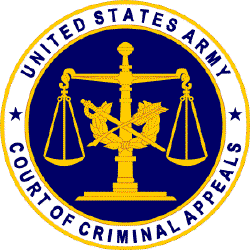Related Research Articles
Non-judicial punishment is a disciplinary measure that may be applied to individual military personnel, without a need for a court martial or similar proceedings.
A court-martial or court martial is a military court or a trial conducted in such a court. A court-martial is empowered to determine the guilt of members of the armed forces subject to military law, and, if the defendant is found guilty, to decide upon punishment. In addition, courts-martial may be used to try prisoners of war for war crimes. The Geneva Conventions require that POWs who are on trial for war crimes be subject to the same procedures as would be the holding military's own forces. Finally, courts-martial can be convened for other purposes, such as dealing with violations of martial law, and can involve civilian defendants.
Military justice is the legal system that governs the conduct of the active-duty personnel of the armed forces of a country. In some nation-states, civil law and military law are distinct bodies of law, which respectively govern the conduct of civil society and the conduct of the armed forces; each body of law has specific judicial procedures to enforce the law. Among the legal questions unique to a system of military justice are the practical preservation of good order and discipline, command responsibility, the legality of orders, war-time observation of the code of conduct, and matters of legal precedence concerning civil or military jurisdiction over the civil offenses and the criminal offenses committed by active-duty military personnel.
Dereliction of duty is a specific offense under United States Code Title 10, Section 892, Article 92 and applies to all branches of the US military. A service member who is derelict has willfully refused to perform his duties or has incapacitated himself in such a way that he cannot perform his duties. Such incapacitation includes the person falling asleep while on duty requiring wakefulness, his getting drunk or otherwise intoxicated and consequently being unable to perform his duties, shooting himself and thus being unable to perform any duty, or his vacating his post contrary to regulations.

Capital punishment is a legal penalty under the criminal justice system of the United States federal government. It can be imposed for treason, espionage, murder, large-scale drug trafficking, or attempted murder of a witness, juror, or court officer in certain cases.
The Uniform Code of Military Justice (UCMJ) is the foundation of the system of military justice of the armed forces of the United States. The UCMJ was established by the United States Congress in accordance with their constitutional authority, per Article I, Section 8, which provides that "The Congress shall have Power. .. to make Rules for the Government and Regulation of the land and naval forces" of the United States.

The United States Court of Appeals for the Armed Forces is an Article I court that exercises worldwide appellate jurisdiction over members of the United States Armed Forces on active duty and other persons subject to the Uniform Code of Military Justice. The court is composed of five civilian judges appointed for 15-year terms by the president of the United States with the advice and consent of the United States Senate. The court reviews decisions from the intermediate appellate courts of the services: the Army Court of Criminal Appeals, the Navy-Marine Corps Court of Criminal Appeals, the Coast Guard Court of Criminal Appeals, and the Air Force Court of Criminal Appeals.
An Article 32 hearing is a proceeding under the United States Uniform Code of Military Justice, similar to that of a preliminary hearing in civilian law. Its name is derived from UCMJ section VII Article 32, which mandates the hearing.
Courts-martial of the United States are trials conducted by the U.S. military or by state militaries. Most commonly, courts-martial are convened to try members of the U.S. military for criminal violations of the Uniform Code of Military Justice (UCMJ), which is the U.S. military's criminal code. However, they can also be convened for other purposes, including military tribunals and the enforcement of martial law in an occupied territory. Federal courts-martial are governed by the rules of procedure and evidence laid out in the Manual for Courts-Martial, which contains the Rules for Courts-Martial, Military Rules of Evidence, and other guidance. State courts-martial are governed according to the laws of the state concerned. The American Bar Association has issued a Model State Code of Military Justice, which has influenced the relevant laws and procedures in some states.

The use of capital punishment by the United States military is a legal penalty in martial criminal justice. Despite its legality, capital punishment has not been imposed by the U.S. military in over sixty years.

Ehren Keoni Watada is a former first lieutenant of the United States Army, best known as the first commissioned officer in the US armed forces to refuse to deploy to Iraq. In June 2006, Watada refused to deploy for his unit's assigned rotation to Operation Iraqi Freedom, saying he believed the war to be illegal and that, under the doctrine of command responsibility, it would make him party to war crimes. At the time, he was assigned to duty with the 5th Battalion, 20th Infantry Regiment, part of the 3rd Brigade, 2nd Infantry Division, as a fire support officer. He was brought before a court-martial in 2007 which ended in a mistrial; the Army subsequently discharged him under "Other-Than-Honorable-Conditions" (OTH) in 2009. An OTH discharge is the least favorable type of administrative discharge from the Army, and is reserved for a "pattern of behavior that constitutes a significant departure from the conduct expected of Soldiers of the Army."
The Navy-Marine Corps Court of Criminal Appeals (NMCCA) is the intermediate appellate court for criminal convictions in the United States Navy and the Marine Corps.

In the United States military, the Army Court of Criminal Appeals (ACCA) is an appellate court that reviews certain court martial convictions of Army personnel.

Reduction in rank may refer to three separate concepts:

The Coast Guard Court of Criminal Appeals (CGCCA) is the intermediate appellate court for criminal convictions in the U.S. Coast Guard. It is located in Washington, DC.

The Air Force Court of Criminal Appeals (AFCCA) is an independent appellate judicial body authorized by Congress and established by the Judge Advocate General of the Air Force pursuant to the exclusive authority under 10 U.S.C. § 866(a). The Court hears and decides appeals of United States Air Force court-martial convictions and appeals pendente lite. Its appellate judges are assigned to the Court by The Judge Advocate General. The Judge Advocate General instructs court-martial convening authorities to take action in accordance with the Court's decisions.
United States of America v. Technical Sergeant Eric P. Marcum, 60 M.J. 198 is a United States Court of Appeals for the Armed Forces (CAAF) decision which, among other issues, upheld Article 125 (Sodomy) of the Uniform Code of Military Justice against a facial substantive due process challenge, and ruled that the Supreme Court's decision in Lawrence v. Texas, 539 U.S. 558 (2003) applied in analyzing as-applied challenges. The decision is thus binding precedent on all courts-martial in determining if an Article 125 prosecution is constitutional.
The Judge Advocate General's Corps, also known as JAG or JAG Corps, is the military justice branch or specialty of the United States Air Force, Army, Coast Guard, Marine Corps and Navy. Officers serving in the JAG Corps are typically called judge advocates.
Unlawful command influence (UCI) is a legal concept within American military law. UCI occurs when a person bearing "the mantle of command authority" uses or appears to use that authority to influence the outcome of military judicial proceedings. Military commanders typically exert significant control over their units, but under the Uniform Code of Military Justice (UCMJ) a commander must take a detached, quasi-judicial stance towards certain disciplinary proceedings such as a court-martial. Outside of certain formal actions authorized by the UCMJ, a commander using their authority to influence the outcome of a court-martial commits UCI. If UCI has occurred, the results of a court-martial may be legally challenged and in some cases overturned.
United States v. Briggs, 592 U.S. ___ (2020), was a United States Supreme Court case involving whether the United States Court of Appeals for the Armed Forces (CAAF) erred in ruling that the Uniform Code of Military Justice allows prosecution of a rape committed between 1986 and 2006 only if it was discovered and charged within five years. The Court, with the exception of Justice Amy Coney Barrett who did not participate on the case, ruled unanimously that under the Uniform Code, such crimes that are "punishable by death" under the Code do not have a statute of limitations unlike similar civilian crimes.